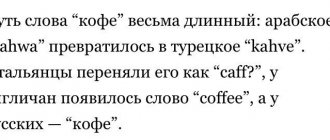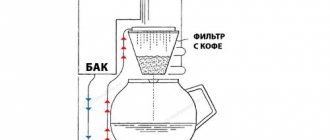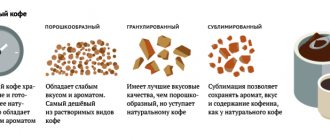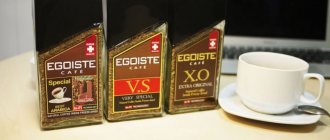The language of any country undergoes various changes over time: foreign words are fixed, the names of modern technical inventions are introduced, and forms of use are simplified. However, there is still ongoing debate about what kind of “coffee” and how it should be said.
What gender does the word coffee belong to?
In the coffee world, due to the emergence of different preparation methods, varieties of berries, names of drinks, many new terms have appeared over the past decades.
Information from history
In Russia, coffee has been known since the 17th century, when a doctor prescribed this drink to Tsar Alexei Mikhailovich as a cure for “arrogance, runny nose and headaches.” It began to be used as a tasty drink under Peter I, after the emperor became addicted to it in Amsterdam. Returning from abroad, in 1718 he issued a decree that guests should be served not only tea, but also treated to a new invigorating drink at assemblies and in the Kunstkamera.
In 1718, Peter I issued a decree ordering that, along with tea, guests should be served a new invigorating drink - coffee.
During the times of the Russian Empire, in addition to the word “coffee”, they also used “coffee” or “coffee”. Writer N.S. Leskov, in his work “Pabubniks” of 1885, writes both options, but for the Russian author they have different shades. “Kofiy” serves to convey village speech.
Forms that end in -y ceased to be the linguistic norm at the end of the 18th century. They are perceived as ignorant and vernacular. The main option remains “coffee”.
The meaning of the word "coffee"
There are several assumptions about where this word came from, but this is still not known for certain.
The Arabic word for a type of wine is qahwah; in Turkish - kahve, which could become the ancestor of the word “coffee”. Perhaps the name of the aromatic drink was given by the Ethiopian region of Kaffa, which is the birthplace of the coffee tree. In Kaffe itself, coffee is called “buno”. Wikipedia reports that in Europe the name of this aromatic drink was the Dutch word koffie, which in 1598 came into English as coffee.
In Russian explanatory dictionaries there are several meanings of the term, for example:
- A plant that produces fruits and grains.
- Coffee beans.
- Ground powder from these grains.
- A drink based on coffee beans.
The birthplace of the coffee tree is the Ethiopian region of Kaffa.
An invigorating word from abroad.
The Russian language is indeed very rich in many foreign words that came to us from other countries. So the word “coffee” appeared in our country only in 1724 with the advent of this drink in our country. And it came to us from the Turkish language.
By the way, the word itself comes from the name of the region in Ethiopia - Kaffa, which is considered the birthplace of the coffee tree.
Then in our country the word changed in different ways: there was “coffee”, and “coffee”, and “coffee”. But in the 20th century they settled on the final option: coffee. Now let's figure out how it is written in various sentences?
In our language, the masculine noun “coffee” is not declined by case and is always used in its original form. Therefore, it would be correct to write the expression: enjoy coffee. For example: He spilled a hot mug of coffee.
What is most surprising is that this one word means: the coffee tree itself, its beans and the drink that is obtained as a result of roasting and milking these beans.
Analysis by composition:
coffee - root; ending null; coffee is the basis of the word.
k - [k] - consonant, paired deaf, paired hard o - [o] - vowel, stressed f - [f'] - consonant, paired deaf, paired soft e - [e] - vowel, unstressed The word has 4 letters and 4 sounds.
Only Marina Khlebnikova can afford to show in her song -
But singers and poets are allowed everything to create an image. In the normative rules of the Russian language, the word coffee is not declined, since it, the word, is alien and wandered into our lexicon from a foreign language. Regardless of any combination of phrases, the word coffee will remain unchanged, just as the love of millions of people for it and my personal love for it remains unchanged. Enjoy your coffee with me.
The word "coffee" is a masculine noun.
A foreign word borrowed from Arabic, the word “qahva” previously meant “a type of wine.” Subsequently, it came into the Russian language from the Turkish language. Means a strong invigorating drink.
How to speak correctly
According to the rules of the Russian language, units of speech ending with the letter -e belong to the neuter gender. However, for example, in the explanatory dictionaries of S. Ozhegov and V. Dahl, the noun “coffee” is classified as a masculine grammatical feature.
There is no clear answer why the name of the invigorating drink began to be used in the masculine gender.
Why has coffee always been classified as masculine?
It is believed that this drink was first mentioned in Russia in the neuter gender. From what moment it began to be used in men’s clothing is unknown. This may have happened under the influence of the elite, who sought to distinguish themselves and emphasize their status in speech: saying “my coffee” was an indicator of prestige.
There is also a version that at first they said “coffee” and “coffee” in the masculine gender, so this term began to be used in the same way. For example, “... you should drink your own coffee” (A. Chakovsky, “Blockade”, 1968) or “She waited until the valet put out the coffee and left” (L. Tolstoy, “War and Peace”, 1867-1869).
Nevertheless, there is no exact confirmation that these obsolete forms were the original ones and that the grammatical feature was fixed from them. According to the research of philologist M. Eliferova, in 1700-1800. the form “coffee” occurred 15 times, “coffee” 25 times, and the form “coffee” 84 times. It follows from this that already in the 18th century. the predominant option was the one well known to everyone.
Can it be used in the neuter gender?
Even before the beginning of the 2000s. in modern Russian, only the masculine gender was considered correct, and only in some dictionaries did colloquial speech allow the neuter gender. But already in 2009, according to the order of the Ministry of Education, it became possible to use this noun both in m.r. and in sr. r., i.e. since then, “delicious coffee” has ceased to be a colloquial option and an indicator of illiteracy.
Many people disagree with this decision and try to stick to only one form.
“Treat coffee” or “treat coffee”?
History shows that language is very mobile and changes according to time. Some words and rules fall out of use, while others undergo changes. This is what happened with the name of the tart hot drink. The rules for using this word have changed along with our language, and in the 21st century it has again undergone changes, which now cause some difficulties.
So what would be correct: “treat me to coffee” or “treat me to coffee”?
How to spell it correctly?
The correct way to use it is COFFEE.
According to the rules of the Russian language, declension of this word by case is unacceptable.
- offer coffee;
- quench your thirst for coffee;
- bring dessert with coffee.
What kind of word "coffee" is in Russian?
The word appeared in the Russian language in the 17th century during the reign of Peter I. It came along with the hot drink of the same name. In the dictionaries of that time the following forms of usage are found: “coffee” or “coffee”.
Accordingly, the gender of words is defined as masculine.
Over time, the letter “th” disappeared, but the generic affiliation remained. Hence the contradiction that we do not understand. The literary norm is to use the word in the masculine gender. Confirmation can be found in the works of classics: A.S. Pushkina, N.V. Gogol, L.N. Tolstoy.
In 2021, the Ministry of Education made a controversial decision, approving the standards of the modern Russian language. The changes made seemed inappropriate to adherents of the literary language. The word “coffee” has become one of the controversial issues. In modern approved dictionaries, its use in the neuter gender is allowed, according to the realities of our time.
Despite the possibility of two variants of use, the case declension remains unchanged. Words borrowed from another language and ending in “-e” or “-o” remain in the nominative singular case in any form.
- I asked the waiter to bring strong coffee.
- I like to eat oatmeal for breakfast and always with coffee.
Etymology of the word "coffee"
The word came to us from the Arabic language (qahwah), where it meant a wine drink. Appeared in European languages through Turkish kahve.
It appeared in Russian in the 17th century and originally sounded like coffee or coffee.
Which is correct: “grinds coffee”, “grinds coffee” or “grinds coffee”
The drink is prepared from coffee beans that are pre-ground. And here the question arises: how to correctly agree the verb with the noun “coffee”.
- I grind coffee;
- you grind coffee;
- you grind coffee;
- he/she grinds coffee;
- they grind coffee.
Although both masculine and neuter forms are considered acceptable as of 2021, most people continue to use it as in classical literature (masculine).
It is important to remember that, regardless of gender, the word is not declined according to cases. Remains in singular and nominative case.
Source: https://znanieinfo.ru/orfografiya/ugostit-kofe-ili-ugostit-kofem.html
Has anything changed in Russian dictionaries?
New alternatives for the use of some words, their grammatical features, like “coffee”, appeared in 2009 in the “Big Phraseological Dictionary of the Russian Language”, “Spelling Dictionary of the Russian Language”, “Dictionary of Stresses of the Russian Language” and “Grammar Dictionary of the Russian Language: Word change." The authors added a second sign “cf. R." and removed the “colloquial” inscription.
Since then, the invigorating drink can be officially used in both genders, although the male one is considered the main one, and the middle one is considered additional.
What kind of word “coffee” is in Russian?
The Russian language reform that took place in Russia some time ago caused a lot of controversy. As a result, the name of the delicious drink was allowed to be used in the neuter gender. People who are used to saying that coffee is “he” and not “it” cannot take this change into account and tirelessly correct everyone who uses this word in the neuter gender. Let's figure out how to speak correctly.
"He" or "it"
As of 2021, drinking coffee in both the masculine and neuter genders is considered correct. But many people get annoyed when others say “my coffee” instead of “mine.” According to the latest changes affecting the official dictionary, you can say “delicious” and “delicious”.
But it is better to adhere to the correct form of using the word “coffee” in spoken and written speech. This is important when a specialist prepares a drink. It is necessary to specify which one to serve: freshly brewed or freshly brewed. The first option is freshly ground grains, filled with water and boiled in a Turk. The second option is to pour the finished powder from a jar with boiling water and infuse it.
This is a word that came from abroad. Words borrowed from foreign languages remain unchanged in the singular and plural if they end in -e and -o. They cannot be inclined not only in writing, but also in oral speech.
Examples of misspelled words:
- coffee is too bitter;
- I want coffee;
- Mom made delicious coffee;
- you have condensed milk with coffee;
- I splashed myself with coffee.
Correct usage:
- coffee is too strong;
- the coffee has already cooled down;
- waiter, please, one coffee;
- add more coffee.
In literary language, the word “coffee” is masculine. Everyone should learn this.
Coffee shop owners, baristas and anyone who views their favorite drink from a professional point of view will never allow themselves to say “it”. Only "he".
A little history
Over time, people began to change the endings and decline in borrowed words. Nouns ending in “e” have become the subject of endless debate. The name of this tonic drink, beloved by many, is borrowed from the English language. According to other sources - from the Netherlands. Coffee is a masculine word. Initially, the drink was called “coffee” or “coffee”.
Over time, the word “coffee” has undergone changes - it began to end with the letter “e”. As a result, a lot of misunderstandings arose and endless disputes began. Previously, schoolchildren were taught that the drink was masculine and they should say “he” and not change numbers and cases. Now is coffee “it”?
In modern Russian there are several meanings of the word “coffee”:
- A plant that produces large fruits with grains.
- Beans that are obtained after processing the fruits collected from the coffee tree.
- Ground grain powder.
- A drink that is brewed or infused.
- An extract from ground beans that serves as the basis for the production of instant coffee drinks.
The word retains the masculine gender, singular number and invariable case in all meanings: natural, ground, soluble.
Why did people start saying that coffee is neuter?
Over the course of every decade, our language improves and undergoes changes. Words borrowed from foreign languages that are inanimate, indeclinable, and have a vowel at the end are usually classified as neuter. For example, metro, dominoes, butter, variety shows. The same goes for coffee.
What has changed in Russian dictionaries
In 2009, several dictionaries were released, which caused confusion among the linguistic community. A team of authors: Cheptsova, Sazonova and Bukchina published a spelling dictionary, where the masculine and neuter genders are indicated next to the word “coffee”. The authors refer to the Big Academic Dictionary, where this word is used in oral speech in the neuter gender. Philologists believed that this did not contradict the rules of the Russian language.
An attempt to classify coffee as a neuter word was unsuccessful. The innovation did not last. Ordinary citizens, teachers and writers who learned from childhood that they should say “mine” and not “mine”, and did not accept the new rule. The masculine gender has been assigned to this noun to this day.
How to speak correctly
Due to recent changes in the Russian language, a person who says “how delicious your coffee is” will not be considered illiterate. For some, the phrase still hurts the ears, and they begin to correct those around them. But in colloquial speech you can say so.
When writing letters, articles, preparing restaurant menus, this noun is left in the masculine gender, without declension.
In order not to get into a sticky situation and not look illiterate, you should learn a simple rule: proceed from what the word “coffee” means at the moment. Examples:
- When it comes to ordering a drink, you need to say "one."
- When talking to a person about coffee that is grown on a plantation, you can use the noun in the neuter gender because it is a plant.
This word is also classified as feminine when referring to coffee grounds. In this case, you cannot say “one” or “one”.
You should not rely on the experience of world history: in different countries this noun can have not only masculine and neuter gender. In Arabic, coffee is feminine. Residents of our country should be guided by the norms of official and traditional dictionaries.
Thus, in Russia the noun coffee is masculine and is not declined. This is confirmed by works of art. In oral speech, it is not prohibited to talk about a drink in the neuter gender. You can't tilt it. You need to say, “I want coffee,” not “coffee.” You shouldn’t correct people who insist on saying “my coffee.” Based on the above, a noun can be neuter or masculine.
At important events, coffee breaks become mandatory for organizers who provide meeting participants with decent food and drinks.
Coffee has long been a part of European culture: it is grown, studied, mythologized, but most importantly, it is enjoyed.
Sourness in taste is considered the main property of coffee.
Source: https://mycoffe.ru/o-kofe/kakoj-rod-slova-kofe.html
Declension by case
In Russian, this word is borrowed and refers to nouns denoting various substances (sugar, cream, blood, etc.), so it cannot be unambiguously classified as either singular or plural.
The word "coffee" is inflected the same way, regardless of meaning, case or number.
Usage examples:
- guests treated to (what?) coffee - TV. P.;
- wash the cup after (what?) coffee - R. p.;
- please make (what?) coffee - V. p.
Dictionaries indicate that this word will be declined in the same way, regardless of meaning, case and number.
Powdered, sublimated or in granules – which coffee is better?
As always, this is a matter of taste. Powdered and granulated coffee is cheaper and more accessible, but it is less aromatic and not as tasty. Freeze-dried coffee is more expensive, but definitely tastier, and its smell is much closer to the “original”, especially if the drink is brewed correctly (read about this below).
Today, the choice of instant coffee allows you to find a product that is as similar in taste to regular grain coffee as possible. It's expensive (often more expensive than buying coffee beans), but it's possible.
Coffee beans LavAzza “Qualita Oro”, 500 g 752 rub.
Lavazza “Qualita Oro” coffee beans, 250 g 351 rub.
Ground coffee in instant Nescafe “Gold”, 750 g -25%
745 rub. 993 rub.
Compagnia Dell'arabica "Jamaica Blue Mountain" bean coffee, 1500 g 48,960 rub.
Ground coffee Lebo “Extra”, for Turkish, 75 g 61 rub.
Coffee capsules Coffesso “Coffee set”, assorted for Nespresso coffee machine, 50 capsules -25%
961 rub. 1281 rub.
Coffee beans Paretto “Celesto”, freshly roasted, 1000 g 1619 rub.
Instant coffee Ambassador “Platinum”, 95 g 230 rub.
Even more coffee at TEA.ru
Additional Information
Today in the coffee industry there are many different types of brewing, serving and recipes for an invigorating drink.
However, not all correspond to the same gender, and some of them still do not have a fixed grammatical norm in Russian dictionaries.
In a cafe you must use:
- Americano - not in dictionaries, but is more often used by analogy with “coffee” in the m.r.
- Cappuccino - you can say in m.r. or cf. R.
- Latte - it is permissible to speak in both m.r. and sr. R.
- Macchiato - not fixed, presumably can be used in both m.r. and cf. R.
- Espresso - should be used in ml.
The use of the noun “coffee” is possible both in the masculine and in the neuter gender “coffee-on”; modern language norms allow both options. Everyone can decide for themselves which grammatical form to choose. However, few people know about the changes made more than 10 years ago, so “good coffee” may still be perceived by others as colloquial.
“Coffee” – he or it?
Today, coffee is one of the most popular drinks among residents of different countries of the world. Over many years, and in some countries even centuries of love for this drink, people have come up with a large number of its varieties, but...
But it turns out that coffee is not only a drink beloved by many, but also a subject of controversy. The question is, “What kind of word is “coffee”?” is very popular and has already become boring to many of his admirers. Writers and philologists have been fighting for the masculine gender for centuries, self-confident grammarians argue with them and defend the form “it,” and those who don’t know rush between these two opinions in an attempt to understand which option is correct. It is precisely because of misunderstandings with the gender of this word that it has become difficult to choose the appropriate definitions for it - “delicious” or “tasty”, “fragrant” or “fragrant”, “what” or “which”, etc.
So what do you call coffee when ordering it, for example, in a cafe or restaurant?










